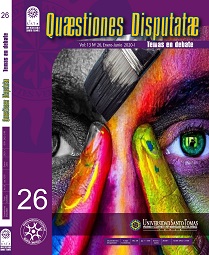Medieval tensions between church and state: a view from Thomas Aquinas
Main Article Content
Abstract
The purpose of this article is to review the link between the thought of Thomas Aquinas in the theological-political problems that are going through his time, since the so-called "Investiture Controversy" and its resolution in the Worms concordat of 1122. For this, we will trace some fundamental elements of medieval law and its relation to the problem of the relationship between the eternal law, the natural law and human law. It is proposed to defend the idea that the Angelic Doctor resists becoming a point of articulation between a medieval and a modern conception of State, that begins to dazzle the latter of the tutelage of the Church, to rescue its own legitimacy in the search for the common Good.
Article Details
How to Cite
Landinez Guio, D. (2020). Medieval tensions between church and state: a view from Thomas Aquinas. Quaestiones Disputatae: Temas En Debate, 13(26), 18-32. Retrieved from http://revistas.ustatunja.edu.co/index.php/qdisputatae/article/view/2006
Section
Articulos Num.26
De acuerdo a la Licencia Creative Commons Atribución-No Comercial-Sin Derivar 4.0 Internacional, se autoriza leer, descargar, copiar, distribuir, imprimir, buscar o enlazar los textos completos de estos artículos, siempre y cuando se conceda el crédito a los autores de los textos y a la Revista Quaestiones Disputatae: temas en debate, como fuente de publicación original. No se permite el uso comercial de copia o distribución de contenidos, así como tampoco la adaptación, derivación o transformación alguna de estos sin la autorización previa de los autores y de la dirección de Quaestiones Disputatae: temas en debate.

Esta obra está bajo una licencia de Creative Commons Reconocimiento-NoComercial-SinObraDerivada 4.0 Internacional.
References
Browne, P. W. (1922). The Pactum Callixtinum: An Innovation in Papal Diplomacy. The Catholic Historical Review, 8 (2), 180-190.
Bueno de Mesquita, B. (2000). Popes, Kings, and Endogenous Institutions: The Concordat of Worms and the Origins of Sovereignty. International Studies Review, 2 (2), 93-118.
Carpintero-Benítez, F. (2013). Sobre la ley natural en Tomás de Aquino. Díkaion, 22 (2), 205-246.
Catto, J. (1976). Ideas and Experience in the Political Thought of Aquinas. Past & Present, 71, 3-21.
Chodorow, S. (1971). Ecclesiastical Politics and the Ending of the Investiture Contest: The Papal Election of 1119 and the Negotiations of Mouzon. Speculum, 46 (4), 613-640.
Copleston, F. (1983). Historia de la filosofía: de san Agustín a Escoto. Barcelona: Editorial Ariel. Tomo II.
Donnelly, J. (1980). Natural Law and Right in Aquinas' Political Thought. The Western Political Quarterly, 33 (4), 520-535.
González, A. M. (2010). Claves filosóficas de la ley natural. Scripta Theologica, 42, 387-407
Goyette, J. (2013). On the Transcendence of the Political Common Good. Aquinas versus the New Natural Law Theory. The National Catholic Bioethics Center, 13 (1), 133–155.
Mendieta y Núñez, L. (1951). La Sociología en la Edad Media. Revista Mexicana de Sociología, 13 (2), 227-235.
Mundy, J. H. (1980). Europa en la Alta Edad Media (1150-1309). Madrid: Aguilar.
Pirenne, H. (2008). Mahoma y Carlomagno. Madrid: Alianza.
Ruiz Rodríguez, V. (2016). Santo Tomás de Aquino en la filosofía del derecho. EN-CLAVES del pensamiento, (19), 13-40.
Tomas de Aquino. (1993). Suma de teología. Madrid: Biblioteca de autores cristianos. Prima Secundae, Cuestiones 90-97. Tomo II.
Weckmann, L. (1993). El pensamiento político medieval y los orígenes del derecho internacional. México: FCE.
Westberg, D. (1994-1995). The Relation between Positive and Natural Law in Aquinas. Journal of Law and Religion, 11(1), 1-22.
Bueno de Mesquita, B. (2000). Popes, Kings, and Endogenous Institutions: The Concordat of Worms and the Origins of Sovereignty. International Studies Review, 2 (2), 93-118.
Carpintero-Benítez, F. (2013). Sobre la ley natural en Tomás de Aquino. Díkaion, 22 (2), 205-246.
Catto, J. (1976). Ideas and Experience in the Political Thought of Aquinas. Past & Present, 71, 3-21.
Chodorow, S. (1971). Ecclesiastical Politics and the Ending of the Investiture Contest: The Papal Election of 1119 and the Negotiations of Mouzon. Speculum, 46 (4), 613-640.
Copleston, F. (1983). Historia de la filosofía: de san Agustín a Escoto. Barcelona: Editorial Ariel. Tomo II.
Donnelly, J. (1980). Natural Law and Right in Aquinas' Political Thought. The Western Political Quarterly, 33 (4), 520-535.
González, A. M. (2010). Claves filosóficas de la ley natural. Scripta Theologica, 42, 387-407
Goyette, J. (2013). On the Transcendence of the Political Common Good. Aquinas versus the New Natural Law Theory. The National Catholic Bioethics Center, 13 (1), 133–155.
Mendieta y Núñez, L. (1951). La Sociología en la Edad Media. Revista Mexicana de Sociología, 13 (2), 227-235.
Mundy, J. H. (1980). Europa en la Alta Edad Media (1150-1309). Madrid: Aguilar.
Pirenne, H. (2008). Mahoma y Carlomagno. Madrid: Alianza.
Ruiz Rodríguez, V. (2016). Santo Tomás de Aquino en la filosofía del derecho. EN-CLAVES del pensamiento, (19), 13-40.
Tomas de Aquino. (1993). Suma de teología. Madrid: Biblioteca de autores cristianos. Prima Secundae, Cuestiones 90-97. Tomo II.
Weckmann, L. (1993). El pensamiento político medieval y los orígenes del derecho internacional. México: FCE.
Westberg, D. (1994-1995). The Relation between Positive and Natural Law in Aquinas. Journal of Law and Religion, 11(1), 1-22.

